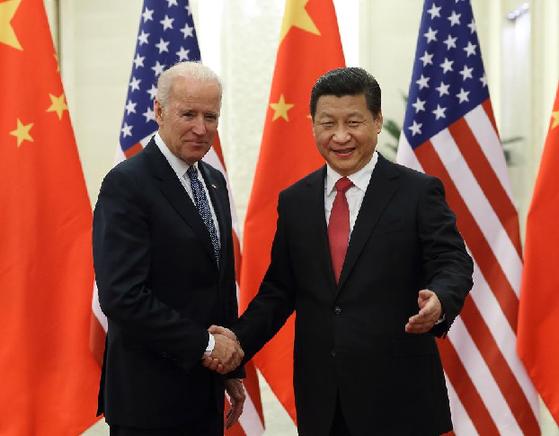Xi holds talks with Biden
 0 Comment(s)
0 Comment(s) Print
Print E-mail Xinhua, December 4, 2013
E-mail Xinhua, December 4, 2013
Chinese President Xi Jinping held talks with U.S. Vice President Joe Biden Wednesday in Beijing, calling to keep the correct direction of China-U.S. relations.
 |
|
Chinese President Xi Jinping (R) shakes hands with US Vice President Joe Biden during their meeting at the Great Hall of the People in Beijing, capital of China, Dec. 4, 2013. [Lan Hongguang/Xinhua] |
At the beginning of their talks, Xi expressed hope that Biden's visit would further strengthen trust, exchanges and cooperation between the two countries.
In their talks, which lasted nearly four hours, Xi said the two countries should firmly maintain the correct direction of bilateral relations, and called for both sides to respect each other's core interests and major concerns, actively expand cooperation, properly handle sensitive questions and disputes, and ensure the steady and sound growth of bilateral relations.
The world is undergoing complicated changes, Xi said. China and the United States, as two major economies and permanent members of the United Nations Security Council, share important obligations to maintain world peace and stability and promote development, he said.
"Enhancing dialogue and cooperation is the only correct choice for us," said the Chinese president.
Speaking highly of the sound momentum of China-U.S. ties since the start of the year, Xi said he and U.S. President Barack Obama reached a consensus in building a new model of major-country relations during their summit in California and on the sidelines of the G20 summit in Russia, emphasizing mutual respect, common prosperity, and lack of confrontation and conflict.
China and the United States have actively worked together in bilateral, regional and global spheres and promoted the growth of bilateral relations, he said.
Xi stressed that both countries should maintain high-level strategic communication, promote the development of mechanisms such as the China-U.S. Strategic and Economic Dialogue, High-level Consultation on People-to-People Exchange, and maintain close military exchanges and dialogues.
He also urged boosted cooperation in the security, anti-terrorism, law enforcement and non-proliferation fields.
Calling trade cooperation the 'propeller' for China-U.S. relations, Xi suggested both sides expand cooperation in the areas of trade, infrastructure building, urbanization, food security and exchanges among local governments, speed up negotiations on a bilateral investment agreement, and promote the upcoming 24th meeting of the China-U.S. Joint Commission on Commerce and Trade (JCCT).
The JCCT, established in 1983, is the main forum for addressing trade issues and promoting commercial opportunities between China and the United States.
"We hope the United States will relax export control over high-tech products for civilian use to China," Xi said.
He welcomed more U.S. companies to invest in China, and encouraged more Chinese enterprises to explore the U.S. market. Xi hoped the U.S. government will offer a fair competition environment for Chinese companies investing in the country.
Xi also proposed enhancing coordination of macro-economic policies and boosting energy and environmental protection as new growth areas for cooperation.
Calling U.S.-China relations the most important bilateral ties in the 21st century, Biden said his country appreciates Xi's strategic foresight, pragmatic attitude and positive efforts in building a new model of major-country relationship.
This relationship, full of hope and opportunities, would help avoid confrontations between existing and emerging major countries, Biden said.
He said he believes both countries are capable of achieving the goal.
Biden said he is impressed by the decision on deepening reforms approved at the third Plenary Session of the 18th Communist Party of China (CPC) Central Committee earlier in November.
Biden said he is convinced that the Chinese people will accomplish their goal of building a strong nation, stressing China's development is in the interest of the United States.
The United States would like to work with China to improve mechanisms, maintain regular dialogues and exchanges, increase substantive cooperation, step up military-to-military exchanges and cooperation, manage differences in a constructive manner and prevent interventions from impacting overall relations, Biden said.
The U.S. vice president reaffirmed his country's willingness to work more closely with China on major international and regional issues and jointly tackle challenges.
Biden arrived in Beijing earlier Wednesday for a two-day official visit. This is his second visit to China as U.S. vice president.






Go to Forum >>0 Comment(s)